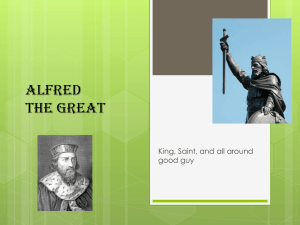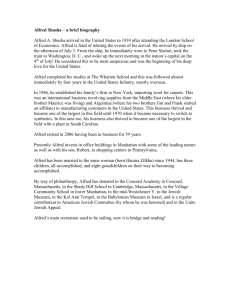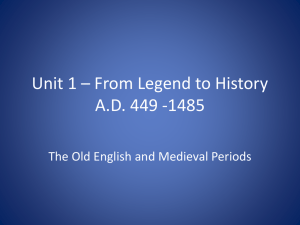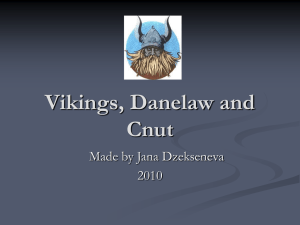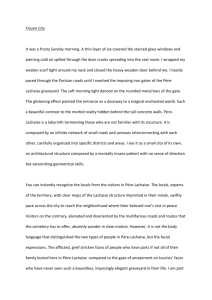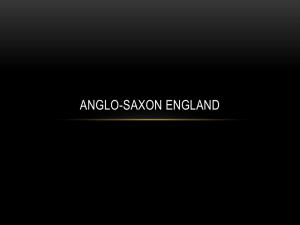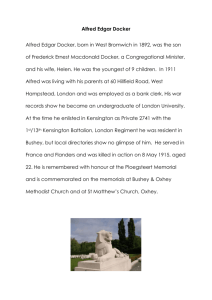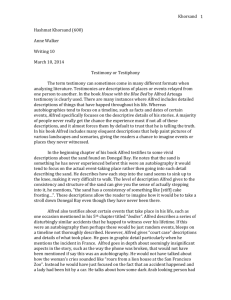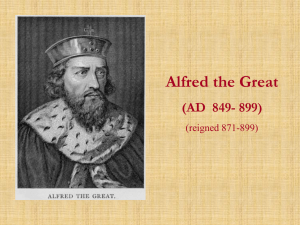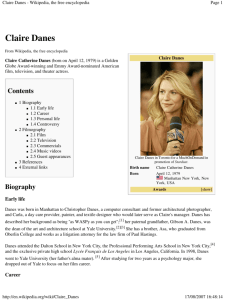The Adventure of English: The Biography of a Language
advertisement
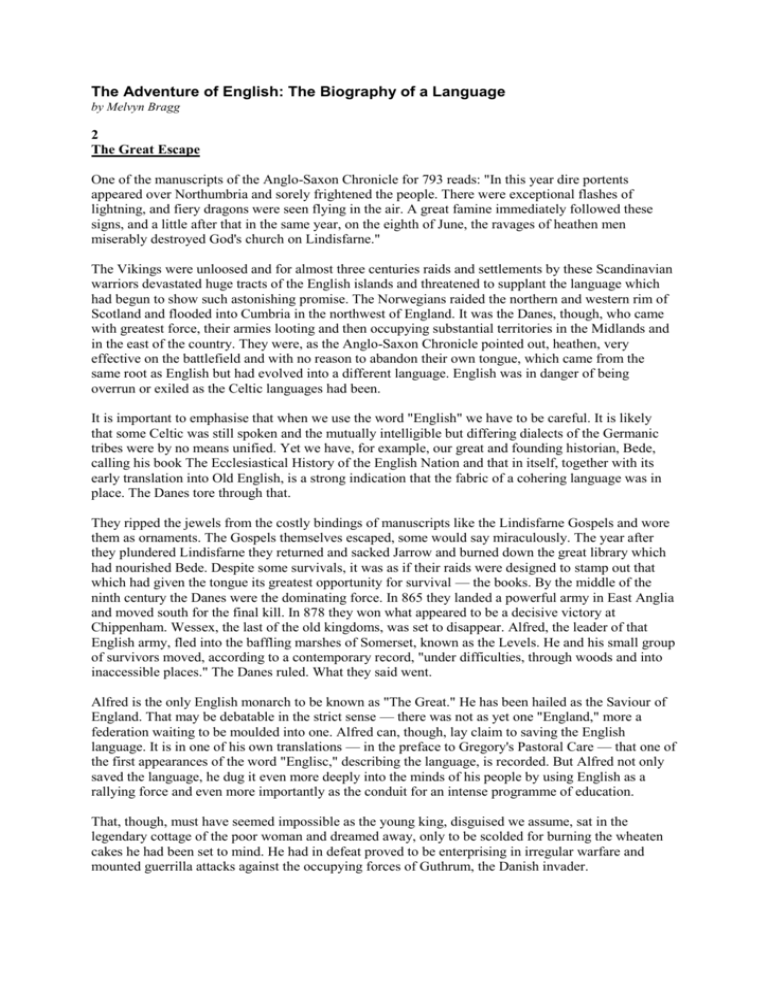
The Adventure of English: The Biography of a Language by Melvyn Bragg 2 The Great Escape One of the manuscripts of the Anglo-Saxon Chronicle for 793 reads: "In this year dire portents appeared over Northumbria and sorely frightened the people. There were exceptional flashes of lightning, and fiery dragons were seen flying in the air. A great famine immediately followed these signs, and a little after that in the same year, on the eighth of June, the ravages of heathen men miserably destroyed God's church on Lindisfarne." The Vikings were unloosed and for almost three centuries raids and settlements by these Scandinavian warriors devastated huge tracts of the English islands and threatened to supplant the language which had begun to show such astonishing promise. The Norwegians raided the northern and western rim of Scotland and flooded into Cumbria in the northwest of England. It was the Danes, though, who came with greatest force, their armies looting and then occupying substantial territories in the Midlands and in the east of the country. They were, as the Anglo-Saxon Chronicle pointed out, heathen, very effective on the battlefield and with no reason to abandon their own tongue, which came from the same root as English but had evolved into a different language. English was in danger of being overrun or exiled as the Celtic languages had been. It is important to emphasise that when we use the word "English" we have to be careful. It is likely that some Celtic was still spoken and the mutually intelligible but differing dialects of the Germanic tribes were by no means unified. Yet we have, for example, our great and founding historian, Bede, calling his book The Ecclesiastical History of the English Nation and that in itself, together with its early translation into Old English, is a strong indication that the fabric of a cohering language was in place. The Danes tore through that. They ripped the jewels from the costly bindings of manuscripts like the Lindisfarne Gospels and wore them as ornaments. The Gospels themselves escaped, some would say miraculously. The year after they plundered Lindisfarne they returned and sacked Jarrow and burned down the great library which had nourished Bede. Despite some survivals, it was as if their raids were designed to stamp out that which had given the tongue its greatest opportunity for survival — the books. By the middle of the ninth century the Danes were the dominating force. In 865 they landed a powerful army in East Anglia and moved south for the final kill. In 878 they won what appeared to be a decisive victory at Chippenham. Wessex, the last of the old kingdoms, was set to disappear. Alfred, the leader of that English army, fled into the baffling marshes of Somerset, known as the Levels. He and his small group of survivors moved, according to a contemporary record, "under difficulties, through woods and into inaccessible places." The Danes ruled. What they said went. Alfred is the only English monarch to be known as "The Great." He has been hailed as the Saviour of England. That may be debatable in the strict sense — there was not as yet one "England," more a federation waiting to be moulded into one. Alfred can, though, lay claim to saving the English language. It is in one of his own translations — in the preface to Gregory's Pastoral Care — that one of the first appearances of the word "Englisc," describing the language, is recorded. But Alfred not only saved the language, he dug it even more deeply into the minds of his people by using English as a rallying force and even more importantly as the conduit for an intense programme of education. That, though, must have seemed impossible as the young king, disguised we assume, sat in the legendary cottage of the poor woman and dreamed away, only to be scolded for burning the wheaten cakes he had been set to mind. He had in defeat proved to be enterprising in irregular warfare and mounted guerrilla attacks against the occupying forces of Guthrum, the Danish invader. He realised that guerrilla warfare would never be enough. To defeat the Danes he had to bring them to open battle. His army had been scattered and many had been slaughtered. But they were not wiped out. In the spring of 878, Alfred sent out a loyalty call to the men of the shire fyrds — the county armies, the basis of the great county regiments. About four thousand men joined him, mainly from Wiltshire and Somerset. We are told they were armed only with shields, battleaxes and throwing spears. They mustered at Egbert's Stone, where trackways and ridgeways met. Two days later they advanced against the Danish army of about five thousand men, who had positioned themselves brilliantly on high ground at Ethandune (Edington, in Wiltshire) on the western edge of Salisbury Plain. Drumming their shields and led from the front by the young king, they stormed the heights. Contemporary accounts tell us that what followed was a rout, a slaughter of the Danes. Modern historians question that, but there is no doubt that Alfred and his men prevailed. His crown and his kingdom were repossessed. The Danes surrendered. Their leader Guthrum was baptised as a Christian, with Alfred in conciliatory attendance. A great white horse was carved into a Wiltshire hillside to commemorate the victory — undoubtedly a key victory for an emerging England and a crucial victory for English. Alfred had saved the language. It is worth spending a few sentences on what might have been. The Danes were fierce and conquering tribes and had they occupied the whole of the land it is very likely that the final tongue would have come out of their dialects and not the "English" dialects. Would that have mattered? Very likely, yes, I think. Their written records were meagre compared with the traditions already well established in the rich lands they had all but overrun. Their basic attitude to written language was to burn it or, more helpfully for the future, toss it aside. And though their version of a Germanic dialect might over time have dug in, it would have taken centuries and who knows whether it would have held English's vital combination of deep obstinacy and, when faced with real extinction, astonishing flexibility and that vital survival technique, the power to absorb. What happened to English after the Battle of Ethandune was that it not only endured, it thrived, it grew. Having held steady under fire, it moved forward. The two principal reasons for this were Alfred himself and what seems to me to be the profoundly self-preserving nature of the language which had so slowly and doggedly alchemised into English. Sometimes I think that it is a pity that the Victorians dubbed Alfred "The Great." It makes rather a nursery hero of him. He was much better than that. This is not the place to describe the full range of his achievements, but with regard to English his contribution was unique. The Danes had been defeated but they were a persistent enemy. They would and they did come back again and again. Alfred had won a victory but the war was not over. He knew that the kingdom and tribes he now commanded were still wounded from the defeats they had suffered. They needed to feel safe, they needed to feel protected, they needed to feel part of a winning side. Alfred's use of the English language united them. He was the first but by no means the last to see that loyalty and strength could come through an appeal to a shared language. He saw that inside the language itself, in the words of the day, there lay a community of history and continuity which could be invoked. He set out to teach the English English and make them proud of it, gather around it, be prepared to fight for it. He recognised that the Danes would not accept subjugation, nor did he have the manpower to enforce it. So he drew a line diagonally across the country from the Thames to the old Roman road of Watling Street. The land to the north and east would be known as the Danelaw and would be under Danish rule. The land to the south and west would be under West Saxon, becoming the core of the new England. This was no cosmetic exercise. No one was allowed to cross the line, save for one purpose — trade. This act of commercial realism would more radically change the structure of the English language than anything before or since. Trade refined the language and made it more flexible. The Vikings had brought their own languages, particularly that of the Danes, but also the language based on the kindred Norwegians. Up to about AD 1000, these were pretty much undifferentiated and known as Old Norse. Deep inside the Danelaw they were attempting to impose this speech as much as they imposed their martial sovereignty. Questions 1. What do you think a “portent” is? 2. What is a “famine”? 3. What does “supplant” mean? 4. Where did the Vikings who raided the British Isles come from? 5. Why do we have to be careful when using the word “English”? 6. What is a “cohering language”? 7. What was the attitude of the Vikings towards books? 8. Do you know the story of Alfred and the cakes? 9. Replace the word “mustered” with another. 10. Why did Alfred’s men muster at Egbert’s Stone? 11. How was the victory commemorated? 12. What might the linguistic result have been if the Danes had won? 13. What does “doggedly” mean? 14. How did Alfred reach a compromise with the Danes? 15. Why does Melvyn Bragg feel that it is a pity that the Victorians called Alfred “The Great”?
